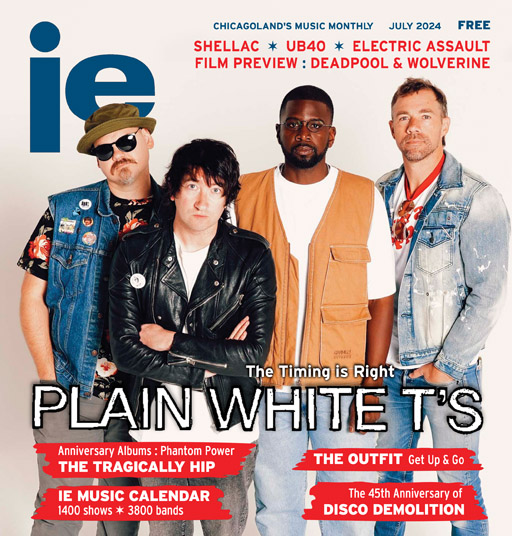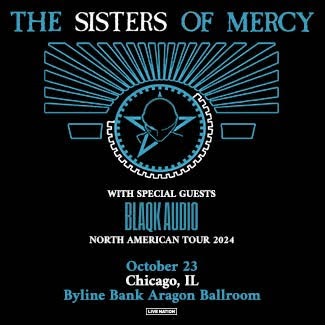Rock ‘N’ Roll At The Goodman
The Goodman Stages A Rock Revolution

During the late 1960s, rock’s leading singers and songwriters, and their growing legion of long-haired flower children and liberal followers, were bragging about the a-changin’ times, chanting to give peace a chance, and all wanting a revolution to change the world.
Runs: May 2nd through June 7th at The Goodman Theatre in Chicago.
Many hippie mainstays, including environmental awareness, meditation, yoga, health foods, and a freer sharing of information to the masses (the Internet), did find their way into the mainstream.
But the radical social and governmental upheaval they truly desired never materialized; boundless hippie optimism and idealism burned hot and fast, darkened by the Manson murders and quickly subsumed by a ’70s pessimism and institutional distrust borne of Vietnam and Nixon’s Watergate.
This distrust permeated the U.S. psyche for more than three decades, has been refueled since 2003 by President Bush’s ever-changing justifications for invading Iraq, and was ignited again with the recent financial collapse and Wall Street debacle.
Aside from making an indelible mark on several aspects of pop culture and bringing much-needed attention to important world issues like poverty, hunger, and AIDS, alas, rock music hasn’t really changed the world (sorry, Bono).
But perhaps rock music – with its timeless tenets of rebellion, questioning authority, and a thirst for personal freedom – can produce change within the world. Perhaps it already has.
It’s this lesser but still significant role of change agent that rock music might have symbolized in the Czech fight against an oppressive government and Iron Curtain culture that anchors the action of Tom Stoppard’s enlightening play, “Rock ‘N’ Roll.”
The award-winning drama, which had successful runs in London in 2006 and on Broadway in 2007, opens at The Goodman Theatre on May 2nd and runs through June 7th. It is directed by Charles Newell (artistic director at Chicago’s Court Theatre) and stars Timothy Edward Kane as Jan, Stephen Yoakam as Max, and Mary Beth Fisher as Esme.
Stoppard, the Czech-born playwright who left the country at a young age during the Nazi invasion and eventually studied in England, has written a number of lauded and respected plays throughout his diverse 40-year career, including “Rosencrantz & Guildenstern Are Dead” and the Tony Award-winning “The Coast Of Utopia.” He also won the screenplay Oscar for Shakespeare In Love.
Stoppard’s “Rock ‘N’ Roll” challenges and inspires, forcing the audience to think, feel, respond, and rejoice – all the exciting elements of true rock ‘n’ roll. It centers on rock music’s role in the growing, 22-year cry for democracy in Soviet-controlled Czechoslovakia. Set in Prague and Cambridge, England, the story begins as Soviet tanks arrive in 1968, and it ends at a Rolling Stones concert as Mick Jagger and the boys rock the Eastern Bloc in 1990.
Semi-autobiographical for Stoppard, it explores the contrasting views and ideals of a young Czech student and rock fan, Jan, and his mentor, Max, an older, British professor. The restless Jan is angered and frustrated by the harsh Soviet rule in his country, while the stubborn and stoic Max remains committed to the Communist agenda. The story also focuses on a long-distance relationship between Jan and Max’s daughter, Esme; their feelings are nurtured by a shared love of music.
According to Robert Falls, artistic director of The Goodman, the theater decided to present the play because of a longstanding admiration for Stoppard’s work (The Goodman previously produced an earlier Stoppard play, “Arcadia”), and the essential power and messages that Stoppard expresses in “Rock ‘N’ Roll.”
“There’s a great energy in it. I know our audiences will react to it. Although, I’m sure there will be a few people wanting us to turn down the volume,” Falls jokes.
“Given its setting and circumstances, this may seem like a deep, heavy show. But it’s one of Stoppard’s lightest and fun,” Falls explains, “a warm, joyous, upbeat, celebration of freedom and revolution, and the power of rock ‘n’ roll.”
Director Charles Newell elaborates. “Stripped of the history and the politics, at its core this is an emotional story with a huge heart. It’s basically about whom we love and how we love them.
“These characters may be living under difficult circumstances – in the world around them and in their personal relationships – but they learn about themselves and ultimately, find love. And they make those connections through the music,” Newell says. “Music provides a rich, emotional experience for the characters and the audience as well.”
For Stoppard, rock is more than just background noise as the determined, dissenting voices in Soviet-ruled Czechoslovakia refused to be quieted under government repression. Along with its historical, political, generational, and philosophical themes, Stoppard champions rock ‘n’ roll’s importance in this desperate cultural fight for freedom and positive social change.
Not merely an audio accessory, for Stoppard, rock music is a living, breathing entity.
“Rock music is a character. Stoppard establishes this through specific groups, artists, and songs, and especially how and where he places them,” says Falls, who directed Eugene O’Neill’s “Desire Under The Elms” (which is now on Broadway) at The Goodman in January. Falls bravely featured the complete six-minute version of Bob Dylan’s haunting “Not Dark Yet” to eerily foreshadow O’Neill’s climax of murky marital deceit and incest.
“There is a distinct emotion in each song Tom Stoppard chooses. Transitionally and emotionally, music moves the story from scene to scene, drives and comments on the action, and makes people feel,” Newell says.
Stoppard selectively spices his play with rousing songs of mood, message, activism, aggression, liberation, and celebration, including tracks by Dylan, The Beatles, The Stones, The Velvet Underground, The Beach Boys, John Lennon, The Doors, The Grateful Dead, U2, The Cure, Pink Floyd, and most notably, Floyd’s founder and eternal guiding force, Syd Barrett.
“Barrett is presented as a major influence in the story, as someone who is not corrupted or willing to become the corporate rock stars that Pink Floyd ultimately became after Barrett left the group,” Falls says. “Stoppard also uses Barrett’s own tragic, personal decline through the years [Barrett ironically died during the play’s initial run in 2006], plus his appearance in an early dream sequence, to portray Barrett as the symbol of purity, of a true artist, an idealist.”
As for actual history, popular underground Czech rock group The Plastic People Of The Universe is hailed by Stoppard in the play as a vital, visceral voice of Czech dissent. During the Communist rule, The Plastics and its fans were arrested and considered enemies of the government. This arrest drew public outrage, helping advance the anti-Communist movement in Czechoslovakia.
In his introduction, Stoppard writes, “The band was not interested in bringing down Communism, only in finding a free space for itself inside the Communist society. But, of course, there was no such space . . . in the logic of Communism, what the band wasn’t interested in and what the band wanted could not in the end be separated.”
In a twist of fortunate theatrical irony, The Plastics was named in part after a Frank Zappa song (“Plastic People”), and director Newell owns an expansive Zappa music collection. “Aside from a few imports, I’d say I have close to everything he’s ever done,” Newell beams.
He agrees Stoppard’s story about change may also gain new relevance today, given the “change agenda” mandated by the election of President Obama.
“Yes, there could be similarities because of the optimism that change brings. With change there is hope, and that’s what the play conveys – a desire for things to get better,” Newell says.
Newell eagerly awaits reactions to the show’s climax, when the Soviets have left and Jan and Esme finally get together at the 1990 Rolling Stones show in Prague. “We’re going to crank up The Stones loud. Real loud.”
The perfect way to end a true “Rock ‘N’ Roll” show.
—James Turano










